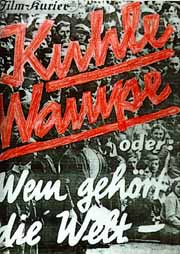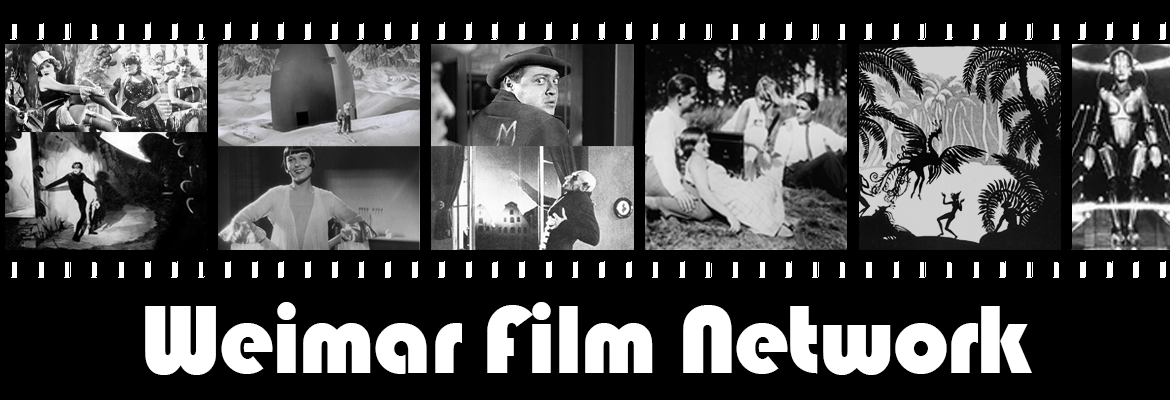
© Wikipedia Commons
Forward! Don’t Forget!: Review of Kuhle Wampe oder Wem gehört die Welt? (1932)
Kip Wilson, YA author of White Rose and The Most Dazzling Girl in Berlin
Kuhle Wampe oder Wem gehört die Welt? (1932) is a masterpiece of Weimar cinema that combines excellence in writing, direction, and musical accompaniment, all working together with factory-line precision to offer a glimpse into proletariat Berlin. The key to the film’s brilliance lies with the collective of artists who created it: the writing team of Bertolt Brecht and Ernst Ottwald, director Slatan Dudow, and composer Hanns Eisler.
These core creatives—and Communist supporters—present a city whose residents are suffering after years of hyperinflation, unemployment, and political strife. They waste no time getting their political point across. The suffering, already clear in the initial montage of tenements and factories, only mounts as headlines flying by feature growing unemployment numbers. The film then shifts to a more human focus on the impatient gaggle of young people waiting for the release of the job ads before setting off to the locations of the listings on their bicycles, accompanied by frantic, desperate music. Even then, there’s no respite, as they’re unfortunately and disappointingly turned away.
Beyond the efforts of the creative team, the acting in the film is also superb. Hertha Thiele, who had already achieved fame in the groundbreaking lesbian cult classic Mädchen in Uniform (1931), plays the starring role here as Anni, a factory worker whose father and brother are both unemployed. After her brother is driven to suicide by a combination of his own despair and his parents’ lack of compassion, the family is subsequently evicted for non-payment of rent. Anni turns to her boyfriend Fritz (Ernst Busch) for help. He invites them out to Kuhle Wampe east of Berlin on the Müggelsee—an actual tent city in operation from 1913 to 1935. The film’s scenes shot on location—including the streets of Berlin, the Kuhle Wampe site, and the S-Bahn—are certainly part of what gives the film its authentic flavor.
But it’s not all fun and games out at Kuhle Wampe. Fritz gets Anni pregnant, and once she realizes his eventual agreement to become engaged isn’t voluntary, she turns to other solutions, moving in with her co-worker Gerda (Martha Wolter) and getting more involved in the left-wing workers’ movement, thus staking her claim as a revolutionary against those aiming for tyranny and oppression.
The action leads to a sports festival, where the main focus is on the movement of the crowd of young athletes—including Gerda—participating in rowing and other racing events. Eisler’s music, which accompanied the frenzied pace of the bicyclists at the beginning of the film and turned romantic with “Das Frühjahr Kommt” at Kuhle Wampe, steals the show here with the “Solidaritätslied”—a catchy earworm with a passionate plea for action that remains in the subconscious long after the film finishes.
The film’s climactic scene—a discussion between strangers in a packed car on the S-Bahn—was directed by Brecht and culminates with the ominous question of who will change the world. A young man points to several older people in the car, saying it won’t be any of them, but Gerda speaks for herself and her fellow young activists with the response, “Those who don’t like it!”
This highly political film begins with harsh reality and ends with hope, but it unfortunately didn’t signal the beginning of a mass wave of change these artists desired. Instead, by the time of the film’s release in May 1932, the Weimar Republic already lay on its deathbed. Once the Nazis came to power in 1933, Kuhle Wampewas at the top of the list of films banned and withdrawn.
Most of those involved with the film left Germany, including Dudow, Brecht, Eisler, and Thiele. A notable exception is the actress who played Gerda. Martha Wolter stayed in Berlin and became a member of the Red Orchestra resistance group with her husband Walter Husemann. After the couple’s arrest in 1942, Walter was executed in Plötzensee prison. Martha remained imprisoned until liberated by the Red Army in 1945—having at least done her part to try to change the world.

